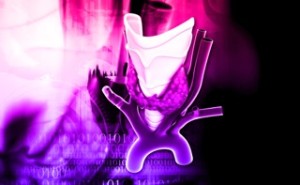By Shannon Flynn
Everyone has a thyroid gland, but most people don’t give much thought to this little, butterfly-shaped gland in the base of their neck. Most of the time, it does what it’s supposed to do: it produces the hormones that control the body’s metabolism. However, this isn’t the case for the 20 million Americans who have some type of thyroid disease.
One of the most common is hypothyroidism, a disease where the thyroid doesn’t produce enough hormones, which causes the metabolism to slow down. This is more common in people over the age of 60 and significantly more common in women. People are also more likely to develop the disease if they have a first-degree relative with it.
The Most Common Cause and Symptoms
The most common cause of hypothyroidism in the U.S. is an autoimmune disease called Hashimoto’s disease. Hashimoto’s causes the body to produce antibodies, which attack the thyroid. While not every case of hypothyroidism is caused by Hashimoto’s, the two often go hand in hand.
The symptoms of hypothyroidism are varied and generalized, which can make the disease difficult to diagnose. The symptoms include: fatigue, forgetfulness, depression, bloating, weight gain, constipation, irregular periods, low sex drive, dry skin, thinning hair, increased sensitivity to cold, and muscle cramps and weakness.
Testing and Diagnosis
If you think you might have hypothyroidism, the first step in diagnosing it is a blood test that measures thyroid-stimulating hormone (TSH). If your test shows a high level of TSH, then your thyroid is underactive and you have hypothyroidism. High levels of TSH indicate that the thyroid isn’t working properly and needs more TSH to make it produce hormones. The normal range for TSH has been tinkered with over the years. However, the normal range now stands at 0.4-4.0.
Your doctor might also perform two additional blood tests to confirm your diagnosis. The first test checks your T4 levels. Low levels of T4 confirm a diagnosis of hypothyroidism. The second test checks for antithyroid antibodies to see if you have Hashimoto’s disease.
To Treat or Not to Treat
Doctors recommend medication if your T4 levels are low and your TSH levels are above 10.0. The goal of medication is to ease the symptoms of the disease and prevent future health problems, such as heart problems and infertility.
So, what if you’re in the 4.0 to 10.0 range? Most doctors say that medication doesn’t usually help patients in this range. However, your doctor might try medication for a few weeks or months if you have severe or uncomfortable symptoms. If your symptoms improve, then your doctor will likely keep you on medication. If your symptoms remain the same, then your doctor will recommend stopping treatment.
There is one time when doctors are particularly aggressive with hypothyroidism treatment: when a patient is pregnant. If you’re pregnant or trying to become pregnant, your TSH levels should be 2.5 or lower. Hypothyroidism in pregnant women can cause serious problems with the pregnancy such as miscarriage and preterm labor and developmental problems with the baby like low birth weight and low IQ.
Many patients are excited to begin treatment because they hope it will help them lose weight. However, not all patients will lose weight after starting treatment. In fact, while some patients lose weight, others stay the same or even gain weight, as their appetite increases. As a result, weight loss shouldn’t be the ultimate goal of treatment.
Treatment Options: Synthetic and Natural
The goal of thyroid treatment is to replace the missing hormones in your body. As a result, synthetic T4 hormone medications are a popular choice. Some of these medications include Synthroid and Levothroid. Doctors want to use the lowest dose possible to get TSH levels within an acceptable range.
Doctors and researchers are also studying natural remedies. There’s evidence that selenium can help hypothyroidism; however, researchers are still studying the supplement’s effects. Iodine is also thought to improve hypothyroidism. However, iodine only works if you’re deficient in it and most people in the U.S. are not. It’s important to check with your doctor before adding any supplements to your treatment plan.
Online Resources
There’s a wealth of hypothyroidism resources online, but the internet can also be full of scams and misinformation. Countless websites try to sell unproven supplements to “cure” hypothyroidism. Keep in mind that if something sounds too good to be true, it probably is. The internet is also full of so-called “thyroid coaches” who will provide advice, for a price. There’s also information on the web that’s wrong or even harmful.
However, don’t let these warnings keep you from surfing the web. You just need to do your due diligence and use reputable websites. You can feel confident with the results you get from medical search engines like MedlinePlus. You can also trust information you find on the website for the American Thyroid Association.
Sources:

